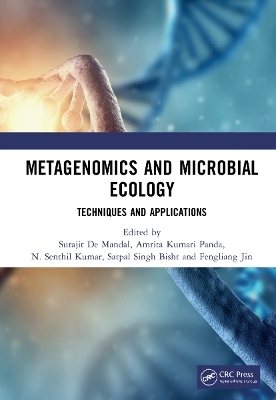
Metagenomics and Microbial Ecology
CRC Press (Verlag)
978-0-367-48734-8 (ISBN)
Microorganisms comprise the greatest genetic diversity in the natural ecosystem, and characterization of these microbes is an essential step towards discovering novel products or understanding complex biological mechanisms. The advancement of metagenomics coupled with the introduction of high-throughput, cost-effective NGS technology has expanded the possibilities of microbial research in various biological systems. In addition to traditional culture and biochemical characteristics, omics approaches (metagenomics, metaproteomics, and metatranscriptomics) are useful for analyzing complete microbial communities and their functional attributes in various environments.
Metagenomics and Microbial Ecology: Techniques and Applications explores the most recent advances in metagenomics research in the landscape of next-generation sequencing technologies. This book also describes how advances in sequencing technologies are used to study invisible microbes as well as the relationships between microorganisms in their respective environments.
Features:
Covers a wide range of concepts, investigations, and technological advancement in metagenomics at the global level.
Highlights the novel and recent approaches to analyze microbial diversity and its functional attributes.
Features a range of chapters that present an introduction to the field and functional insight into various ecosystems.
Surajit De Mandal, Ph.D., is a Post-doctoral Researcher at the College of Agriculture, South China Agricultural University, Guangzhou, P. R. China. He has eight years of research experience and published several research articles in international journals. He also acts as acts as an editorial board member/ reviewer for various international journals. His field of interest includes microbial diversity and metagenomics, molecular phylogeny, bioinformatics, and microbial control of insect pests. He is presently working on microbial community analysis using next-generation sequencing methods. Amrita Kumari Panda, Ph.D is currently working as an Assistant Professor of Biotechnology at Department of Biotechnology, Sant Gahira Guru Vishwavidyalaya Sarguja, Chhattisgarh India. She obtained her Doctoral degree in Biotechnology from Berhampur University, Odisha, India. Dr. Panda received Fast Track Post Doctoral fellowship from Science and Engineering Research Board, Govt. of India, New Delhi. She has more than eight years of research experience in the field of molecular microbiology, microbial diversity and published several articles in national and international peer-reviewed journals. She received Federation of European Microbiological Society (FEMS) Meeting grant award in the year 2014. Her research interest includes Metagenomics and Microbial diversity. N. Senthil Kumar, Ph.D, is Professor in the Department of Biotechnology, Mizoram University with 16 years of teaching and research experience. His field of interest includes Genomics, Molecular phylogeny and Bioinformatics. He is presently working on metagenomics, cancer DNA markers and mutation analysis. During his post-doctoral stint at Sun Yat-sen University, China he was involved in RNAi studies with chitin synthase gene. He has authored more than 90 research papers, and he is the investigator of various national research projects. Satpal Singh Bisht, D.Sc is an inspiring Professor and researcher in the field of Life Sciences since 20 years. Dr. Satpal Singh Bisht, is an internationally acclaimed Biologist / academician and an administrator. He completed his Doctoral Degree in the year 1992 from Kumaun University, Nainital Uttarakhand, India. Dr. Bisht presently working as Professor of Zoology and Dean Biomedical Sciences at Kumaun University. He has published many research papers and articles in the journals of international repute, visited many countries on academic assignments. Prof. Bisht is a member of various academic bodies of many Universities & Colleges. His major research interest includes exploring the gut microbiome of earthworm using next generation sequencing and DNA barcoding of mountain earthworms. He served as editor & reviewer to many journals, nominated and received many professional awards from many academic organizations. Dr. Fengliang Jin is presently working as a Professor in the Department of Entomology, College of Agriculture, South China Agricultural University, Guangzhou, 510642 P.R.China. His major research interest is on the role of non-coding RNAs in the regulation of insect immune signal transduction, exploring the interaction mechanism of insects to entomopathogens using next generation sequencing and bioinformatic analysis and RNAi-based functional analysis of immune-related genes and their role in the regulation of antimicrobial peptides of insects. Prof. Jin served as a Principle Investigator for several research projects related to the development of Biopesticide from various agencies. He has several patents, scientific articles and presently serving as a reviewer and editor in many international journals.
Section-I: An Overview of Metagenomics
Principles and analysis of Metagenomics data
Section-II: Metagenomics tools to access microbial diversity
Metagenomics tools for taxonomic annotation
Section-III: Metagenomics of extreme environments
Metagenomic insights into Microbial communities of desert ecosystems
Metagenomic approaches in elucadation of halophiles in coastal area
Metagenome assembly for functional diversity associated with Xenobiotic degradation
Section-IV: Metagenomics of various ecotypes
Earthworm gut microbiome: The uncharted microbiome
Metagenomics of pollen borne microbes and gut microbiota of honey bee
Viral metagenomics
Fresh water Metagenomics: Overall scenario
Section-V: Applications
Microbiomes and Microbial Ecology in Rice Ecosystems
Understanding the Ecosystem Services of Microbes: It’s a small world after all
Commercial exploitation of microbial communal services to enrich plant microbiome
| Erscheinungsdatum | 01.12.2021 |
|---|---|
| Zusatzinfo | 14 Tables, black and white; 22 Line drawings, color; 5 Line drawings, black and white; 22 Illustrations, color; 5 Illustrations, black and white |
| Verlagsort | London |
| Sprache | englisch |
| Maße | 178 x 254 mm |
| Gewicht | 603 g |
| Themenwelt | Naturwissenschaften ► Biologie ► Botanik |
| Naturwissenschaften ► Biologie ► Genetik / Molekularbiologie | |
| Technik ► Umwelttechnik / Biotechnologie | |
| Weitere Fachgebiete ► Land- / Forstwirtschaft / Fischerei | |
| ISBN-10 | 0-367-48734-9 / 0367487349 |
| ISBN-13 | 978-0-367-48734-8 / 9780367487348 |
| Zustand | Neuware |
| Haben Sie eine Frage zum Produkt? |
aus dem Bereich


